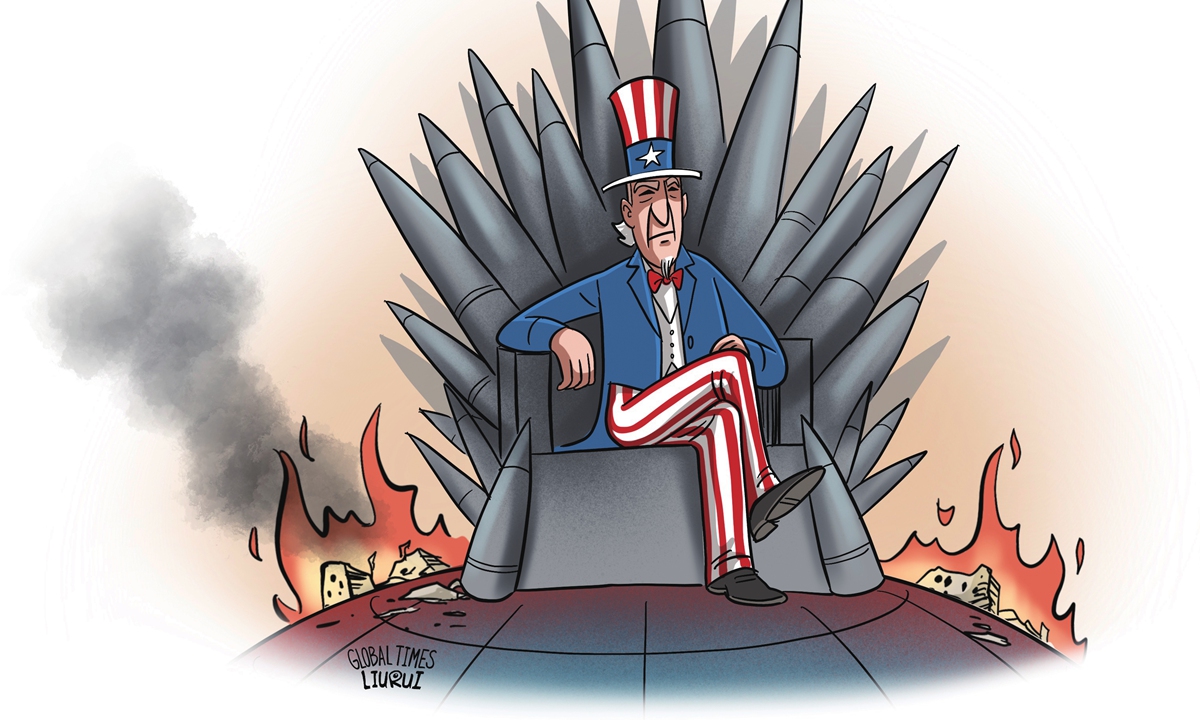

Illustration: Liu Rui/GT
A video circulating on X these days shows that US Marine Corps Commandant General Eric M. Smith claimed at the recent Reagan Defense Forum that the US military has built a "culture of warfighting" because of its participation in wars, such as those in Iraq and Afghanistan. In contrast, he suggested that China's People's Liberation Army (PLA) lacks warfighting experience, asserting that it "can only bluster."
"The advantage lies with us because our last combat was captured on somebody's iPhone 14 … The Chinese's last combat was captured on oil and canvas, and they should not forget that," he added. Not to mention how ignorant such remarks are of history, the fact that a US military commandant would use the US' frequent wars, particularly its experience in killing in Afghanistan and Iraq, to belittle the PLA shows his narrow vision.
The US military officer's remarks are another manifestation of US' belligerent tradition. However, to wear warfighting records as "a badge of honor" and to brag about war records as an achievement is out of tune with a world yearning for peace. Since ancient times, the most fundamental wish of humanity has been for peace and development. Currently, the awareness among people in countries around the world of valuing peace and resisting war has significantly increased.
Rather than recording US military's "glorious" battle achievements, what the iPhone 14 mentioned by Smith provides could be the most direct and firsthand evidence of US belligerence. The US' "culture of warfighting" is a culture of aggression, and its history of national development is one of plunder, exploitation and interference through wars.
An old Chinese saying goes, "A warlike state, however big it may be, will eventually perish; the world in peace, if relaxing vigilance against war, will face danger." Since ancient times, China has promoted the idea of never relaxing vigilance against war. It attaches great importance to the development of national defense and raises awareness about possible conflicts. In addition, for decades, it has never provoked a war or conflict, let alone resorted to military means wantonly.
On the contrary, the US' belligerence has already created a lasting and destructive impact on world peace and development. The country has never stopped clamoring for war and peddling its weapons and equipment. Its preference for using force to solve problem is often viewed by the international community as "expansionist" and "hegemonic."
A symposium on the ancient Chinese military strategist Sun Tzu and his renowned work The Art of War was held in Beijing last week, with over 350 delegates from nearly 30 countries attending the event. The ideas in this book, written more than 2,500 years ago, still resonate widely around the world, largely because of its "peace gene." Amid the frequent conflicts in international hot spots and escalating militarism, Sun Tzu's ideas that emphasize the prevention of conflicts rather than resorting to war hold great significance for the maintenance of lasting global peace.
What about the US' "culture of warfighting"? Can such a militaristic ideology that has already brought tragedies to the world have a vitality of more than 2,500 years? The answer is self-evident. Perhaps some US military officers should start reading Sun Tzu's Art of War, instead of living in their bubble and priding themselves on the blood-stained "badge of honor" of the US as the world's "No.1 warmonger."
No comments:
Post a Comment